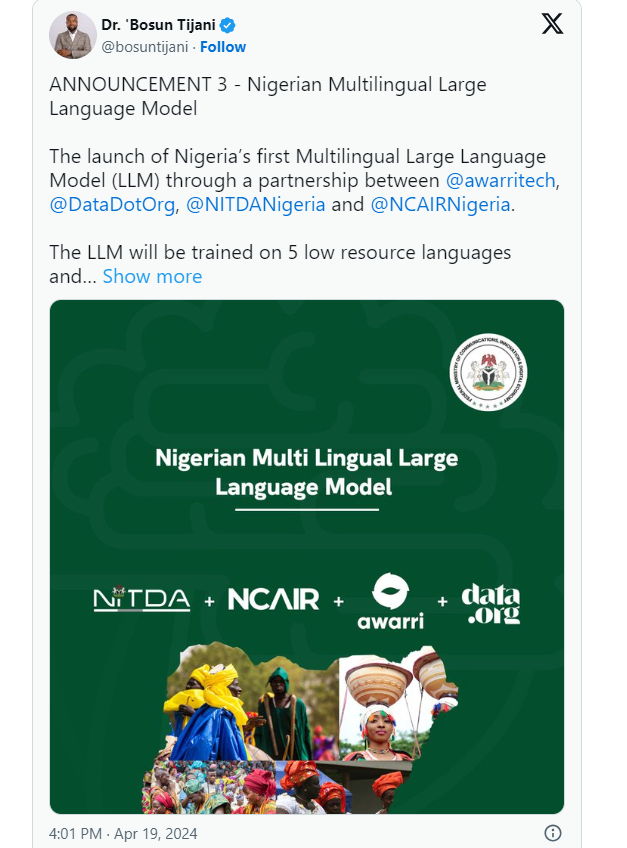Nigeria’s ambition to take a leadership role in artificial intelligence (AI) development in Africa has taken a significant step forward with the launch of the country’s first multilingual large language model (LLM). The announcement was made by Nigeria’s Communications Minister, Dr. Bosun Tijani, following a collaborative effort involving key players in the AI sector.
The launch of the LLM, revealed on Friday, April 19, stems from a four-day AI workshop held in Abuja earlier that week. Dr. Tijani highlighted the collaborative nature of the initiative, which involved Nigerian AI firm Awarritech, global tech company DataDotOrg, the National Information Technology Development Agency (NITDA), and the National Centre for AI and Robotics (NCAIR).
According to Dr. Tijani, the LLM will be trained in five low-resource languages and accented English, aiming to strengthen language representation in existing datasets for AI solution development. The project will benefit from the support of over 7,000 fellows from the 3MTT Nigeria program.

What is Language Model?
A language model is a statistical model that is trained to predict the next word in a sequence of words in a given language. It learns the probability of a word occurring based on the words that precede it in a sentence or text. Language models are essential components of many natural language processing (NLP) tasks, such as speech recognition, machine translation, and text generation.
A large language model (LLM) refers to a language model that has been trained on a vast amount of text data, enabling it to generate more accurate predictions and understand more complex language patterns. These models are capable of processing and generating human-like text, making them valuable tools for various AI applications, including chatbots, language translation, and content generation.
The launch of the LLM is just one aspect of Nigeria’s broader push towards AI development. Following the intensive four-day workshop, Nigeria unveiled its initial draft of the National AI Strategy, showcasing notable advancements and collaborations in the AI sector.
Among the key announcements was a collaboration between 21st Century Technologies, Galaxy Backbone, and NCAIR Nigeria, aimed at expediting the progress of crucial AI projects in the country. Specifically, 21st Century Technology will fund the purchase of GPUs to enhance national computing capacity. These resources will support local researchers, startups, and government entities working on AI projects housed at the GBB Data Centre in the FCT.
Dr. Tijani emphasized the importance of such collaborations in driving Nigeria’s AI agenda forward. With a growing pool of talent and resources, Nigeria is poised to play a leading role in shaping the future of AI on the African continent. The launch of the LLM and the collaborative efforts underway signify a significant milestone in Nigeria’s journey towards becoming a hub for AI innovation and development in Africa.
The collaborative efforts between 21st Century Technologies, Galaxy Backbone, and NCAIR Nigeria are expected to accelerate the pace of AI projects crucial to Nigeria’s technological advancement. By leveraging the expertise and resources of these organizations, Nigeria aims to bridge the gap in AI development and propel the nation towards becoming a global leader in the field.
The funding provided by 21st Century Technologies for the purchase of GPUs will significantly enhance Nigeria’s computing capacity, providing researchers, startups, and government entities with the necessary tools to drive innovation in AI. This investment underscores the commitment of both the public and private sectors to support the growth of AI technology in Nigeria.
Furthermore, the launch of Nigeria’s first multilingual large language model represents a significant milestone in the country’s AI journey. With a focus on strengthening language representation and inclusivity, this initiative demonstrates Nigeria’s commitment to harnessing AI for the benefit of its diverse population.
Dr. Tijani expressed optimism about Nigeria’s AI prospects, highlighting the collaborative spirit and dedication of all stakeholders involved. He emphasized the importance of continued investment in AI education, research, and infrastructure to ensure Nigeria remains at the forefront of technological innovation in Africa and beyond.
What is AI?
AI, or Artificial Intelligence, refers to the simulation of human intelligence in machines that are programmed to mimic human cognitive functions such as learning, problem-solving, perception, and decision-making. AI encompasses a wide range of technologies and techniques, including machine learning, natural language processing, computer vision, robotics, and expert systems.
Machine learning, a subset of AI, involves training algorithms to recognize patterns in data and make predictions or decisions without being explicitly programmed. Natural language processing (NLP) enables computers to understand and generate human language, while computer vision allows machines to interpret and analyze visual information.
AI technologies are used in various industries and applications, including healthcare, finance, transportation, education, and entertainment. They have the potential to automate repetitive tasks, optimize processes, improve decision-making, and create innovative products and services. AI holds the promise of revolutionizing how we work, live, and interact with technology, ushering in a new era of innovation and productivity.
As Nigeria continues to make strides in AI development, the launch of the LLM and the collaborative efforts underway signal a promising future for the country’s tech ecosystem. With strong government support, private sector investment, and a vibrant community of AI enthusiasts, Nigeria is well-positioned to lead the way in shaping the future of AI on the continent. Read Similar Story
Adopted from cointelegraph

















“🌐ATHENE NETWORK🌐 📱 Download ATHENE NETWORK App
https://play.google.com/store/apps/details?id=network.athene.app 📱 💰 EARN FASTER 💰 🎉 EXTRA REWARDS: USDT; LION; GEM 🎉 🎁 Claim Daily Rewards: Free $ATH tokens 🎁 🔐 STAKING 🔐 🔖 Referral Code: b1c56e701883
I am sending you 1π! Pi is a new digital currency developed by Stanford PhDs, with over 47 million members worldwide. To claim your Pi, follow this link https://minepi.com/kanest and use my username (kanest) as your invitation code.
#Athene #Network #ATH #Pi #PiNetwok #OpenEx #OEX
Good news Athene Network launched offical P2P trading Wesbite
Now you buy Sell … Ath Gem Pi on this Trading Site
Register your account link 👇
https://p2p.athene.network/register?invite_token=Pjl7JziaN6
already registered on Athene network
Update your Athene Network profile
👉use this code invite: 61b3fbe999
#OpenEx #Wallet #OEX #Satoshi
OpenEx OEX Wallet
https://oex.to/d/1YtksPn
Satoshi – Global Free Airdrop
Satoshi is the world’s top one free airdrop platform,we will have various outstanding projects and tens of million crypto world residents.
https://www.btcs.love/invite/6yygn
I am sending you 1π! Pi is a new digital currency developed by Stanford PhDs, with over 55 million members worldwide. To claim your Pi, follow this link https://minepi.com/daiv101 and use my username (daiv101) as your invitation code.
I am sending you 1π! Pi is a new digital currency developed by Stanford PhDs, with over 55 million members worldwide. To claim your Pi, follow this link https://minepi.com/dreamtreats and use my username (dreamtreats) as your invitation code.